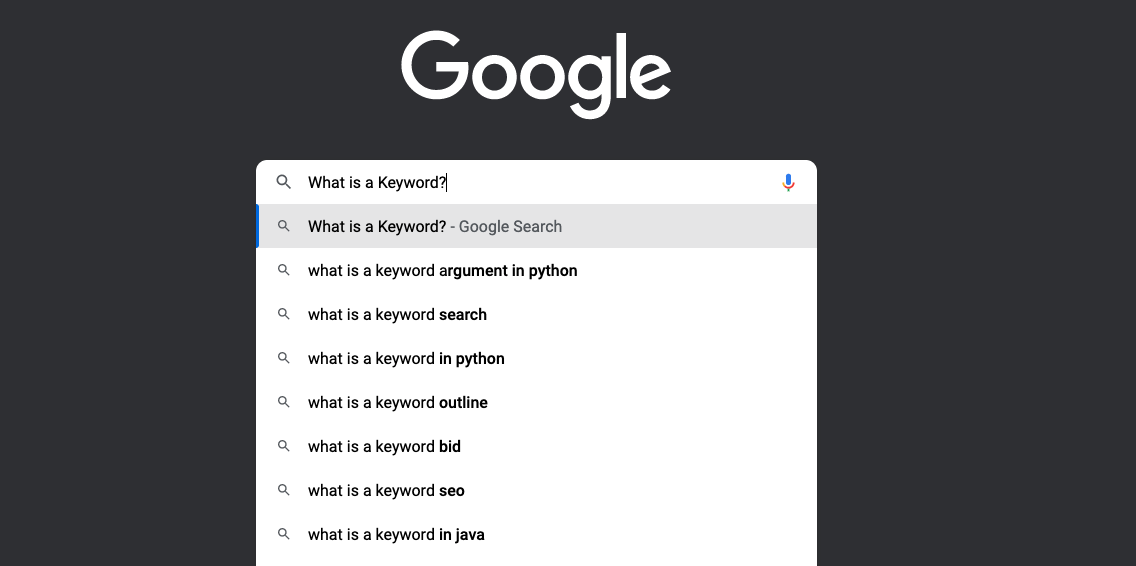//
Mar 16, 2024
3 Key SEO Components in the Age of Generative Search
Welcome to the digital battleground where businesses thrive or falter based on their online visibility—SEO.
It's not just about being present online; it's about strategically positioning your brand to capture the attention of decision-makers.
In this blog, we'll delve into the core components of a robust B2B while embracing the transformative influence of AI. Buckle up as we navigate the intricate web of SEO components and illuminate the path to success.
SEO Component #1: Comprehensive Keyword Research

In B2B SEO strategy, the foundation lies in comprehensive keyword research. Keyword research is an intricate process that extends beyond mere identification of queries to target; it requires a thorough understanding of the nuanced .
Understanding User Intent
Identifying keywords that cater to user intent is paramount. AI tools like have revolutionized keyword research by deciphering context and user queries.
- Natural Language Integration: Optimize content for conversational language to align with how users inquire about .
- Intent-Driven Phrases: Target long-tail keywords that reflect the intent behind B2B searches, such as "innovative B2B marketing strategies for sustainable growth."
AI-Enhanced Keyword Insights
Embrace the power of to elevate your keyword research strategy. AI-driven tools not only identify keywords but also predict user behavior and industry trends.
- Predictive Analytics: Leverage AI tools to forecast evolving search patterns within the B2B landscape, ensuring your content remains ahead of the curve.
Long-Tail Keywords for B2B Markets
Long-tail keywords are the unsung heroes of B2B SEO, offering specificity and relevance.
- Industry-Specific Terms: Tailor keywords to the unique terminology of your industry, resonating with decision-makers and stakeholders.
- Problem-Solution Queries: Address pain points and solutions in your long-tail keywords, such as "effective B2B lead generation strategies."
Competitor Analysis and Strategic Keyword Selection
Understanding what your competitors are targeting provides a competitive edge.
- Competitor Keyword Analysis: Identify keywords that competitors are ranking for and assess the competitiveness of those terms.
- Gap Analysis: Uncover keyword opportunities that your competitors may have overlooked, enabling strategic differentiation.
Evolving Strategies with User Data
The future of keyword research lies in the analysis of user data and behavior.
- User Data Integration: Leverage user analytics to understand how your audience interacts with your content and refine keyword strategies accordingly.
- User Feedback Channels: Tap into user feedback through surveys or social media to identify emerging language trends and refine your keyword targeting.
Ready to revolutionize your B2B marketing strategy? Let's refine your approach together and achieve great things.
SEO Component #2: On-Page Optimization

When it comes to on-page optimization in your B2B SEO strategy, think of it as sculpting the perfect first impression. Your website is not just a digital storefront; it's a dynamic space that communicates with both users and search engines.
Traditional Best Practices for On-Page Optimization
Meta Titles and Descriptions: Crafting the Digital Elevator Pitch
- Keyword Placement: Ensure your primary target keyword is naturally incorporated.
- Character Limits: Keep meta titles under 60 characters and meta descriptions under 155 characters for optimal display in search results.
- Relevance: Align meta content with the page's actual content to improve user experience.
Header Tags: Structuring Content for Readability
- Hierarchy: Utilize H1 for main headings, followed by H2, H3, and so on, to create a clear content hierarchy.
- Keywords in Headers: Include relevant keywords in headers for both SEO and user comprehension.
- Readability: Craft headers that provide a seamless flow of information and aid in content digestion.
Semantic SEO: Beyond Keywords
- Contextual Understanding: AI tools like ChatGPT focus on understanding context and user intent rather than just keywords.
- Natural Language Processing (NLP): Craft content that aligns with how your audience naturally communicates.
SEO Component #3: Link Building

Link building is the backbone of any robust B2B SEO strategy, serving as the bridges that connect your website to the vast landscape of the internet. However, not all links are created equal.
Let's take a deeper look into the world of link building and explore best practices, pitfalls to avoid, and the transformative impact of AI.
Traditional Backlinks: The Foundation of Authority
- Aim for backlinks from authoritative websites within your industry niche.
- Seek out opportunities for guest blogging, contributing expert insights, or participating in industry forums and discussions.
- Monitor your backlink profile regularly to ensure quality and relevance.
- Avoid spammy link-building practices such as buying links or engaging in link farms, as these can result in penalties from search engines.
Leveraging AI for Strategic Insights
- Embrace AI-powered tools to analyze vast datasets and identify high-quality backlink opportunities.
- Utilize to forecast future link-building trends and stay ahead of the curve.
- Leverage AI-driven competitive analysis to identify gaps in your link-building strategy and capitalize on untapped opportunities.
- Incorporate natural language processing algorithms to ensure your anchor text and link placements align seamlessly with your content.
Harnessing Generative Search for Relevance
- Understand the evolving criteria of search engine algorithms and adapt your link-building strategies accordingly.
- Focus on relevance and context when pursuing backlinks, ensuring they complement the thematic relevance of your website.
- Explore opportunities for co-citation and co-occurrence, where your website is mentioned alongside complementary or related content, to enhance thematic authority.
- Emphasize diversity in your link profile, including a mix of anchor text variations, link types (e.g., text, image, video), and referring domains, to signal natural link acquisition to search engines.
Avoiding Common Backlinking Pitfalls
- Steer clear of link schemes or manipulative tactics designed to artificially inflate your backlink profile, as these can lead to severe penalties from search engines.
- Be cautious of participating in reciprocal link exchanges, as these may appear unnatural and raise red flags with search engine algorithms.
- Refrain from over-optimizing anchor text, as excessive use of exact-match keywords can signal manipulation and detract from user experience.
- Prioritize quality over quantity when building backlinks, focusing on earning links from reputable sources with genuine authority and relevance.
The Impact of AI and Generative Search on SEO

The rapid evolution of search engine algorithms, driven by Artificial Intelligence (AI) and generative search technologies, is reshaping the landscape of SEO. As we , it's crucial for B2B marketers to understand the specific ways in which these advancements influence SEO components and strategies.
Voice Search Optimization:
- Keyword Transformation: With the rise of voice-activated assistants, B2B SEO strategies need to adapt. Users speak queries differently than they type them. Incorporating natural, conversational language and long-tail keywords becomes paramount.
- Content Structuring: AI-driven algorithms favor content that directly answers voice queries. Structuring content in a Q&A format or providing concise, informative snippets enhances visibility in voice search results.
Personalized Content Delivery:
- Behavioral Analysis: AI tools analyze , understanding preferences, and predicting future actions. Incorporating these insights into content strategies allows for personalized content delivery, enhancing user engagement.
- Dynamic Content Modification: On-page optimization transcends static keyword placement. AI-driven tools dynamically modify content in real-time, ensuring it remains relevant to user preferences and search engine algorithms.
Generative Search's Influence on Content Discoverability:
- Algorithmic Prediction: Generative search algorithms predict user needs before explicit queries. Crafting content that anticipates these needs enhances discoverability and positions your brand as an authority in your industry.
- Semantic Understanding: Generative search goes beyond keyword matching, understanding the context and semantics of content. B2B SEO strategies should focus on creating in-depth, comprehensive content that aligns with semantic search principles.
AI-Driven Insights for SEO Strategies:
- Data-Driven Decision Making: AI provides actionable insights by analyzing vast datasets, allowing marketers to make data-driven decisions in real-time. This influences the adaptability and agility of SEO strategies.
- Competitor Analysis: AI tools excel in competitor analysis, revealing gaps and opportunities in competitor strategies. Leveraging this information enhances the competitiveness of your SEO strategy within your .
Evolving Search Engine Algorithms:
- Continuous Adaptation: Search engines are deploying AI to refine their algorithms continuously. Staying abreast of these algorithmic changes and adapting SEO components accordingly is crucial for sustained visibility and success.
- Algorithmic Learning: AI algorithms learn from user interactions, refining search results based on user behavior. B2B SEO strategies need to align with these learning processes to maintain a prominent position in search engine rankings.
Key Components of SEO Are Evolving. Are You Ready?
The fusion of AI and generative search with traditional SEO components is not just a trend; it's a paradigm shift. B2B marketers who embrace these advancements and incorporate them into their will not only stay relevant but will lead the charge in the ever-evolving digital landscape.
The future of SEO is dynamic, adaptive, and AI-driven, and the success of your SEO strategy lies in agility.
Mastering the basics while embracing the transformative power of AI is the key to dominance. Comprehensive keyword research, on-page optimization, and strategic link building remain the pillars of success. However, it's the infusion of AI and the understanding of generative search that will propel your strategy into the future.
As you navigate this ever-evolving landscape, remember—SEO is not a one-time effort but a continuous journey. Adapt, optimize, and stay ahead of the curve.
Ready to revolutionize your B2B marketing strategy?
a Denver-based advertising firm. At Watermark, we specialize in tailor-made B2B marketing strategies that consistently captivate your audience, elevate your brand, and achieve optimal outcomes. Armed with a data-driven approach and our commitment to inbound marketing methodology, we implement the exact marketing tactics needed to accomplish your objectives.
Weak search visibility complicating your brand’s opportunities?
Weak search visibility complicating your brand’s opportunities? Gain clarity, measure success, and differentiate your brand with data-informed SEO services that drive real results. Ready to grow? Contact us today.







